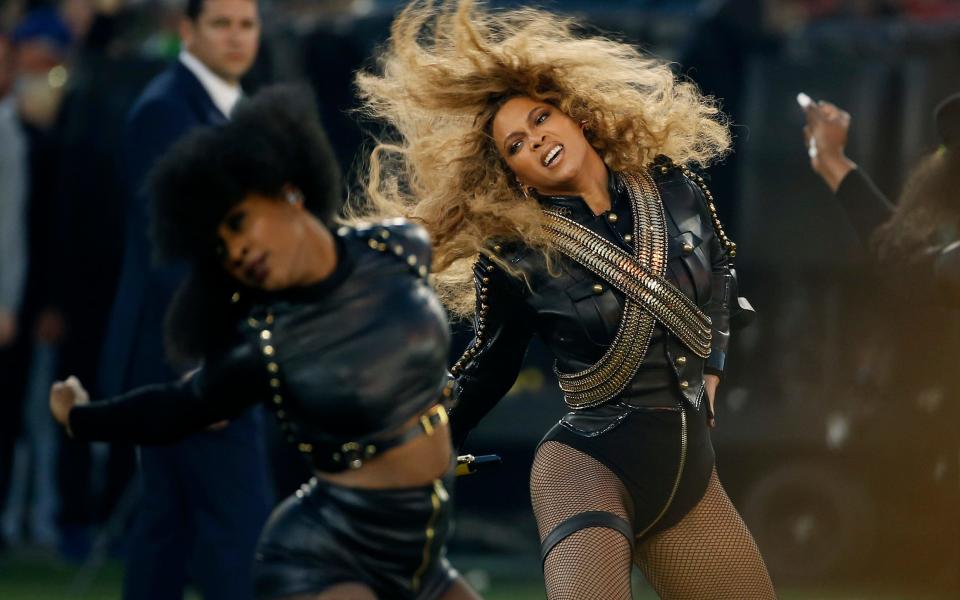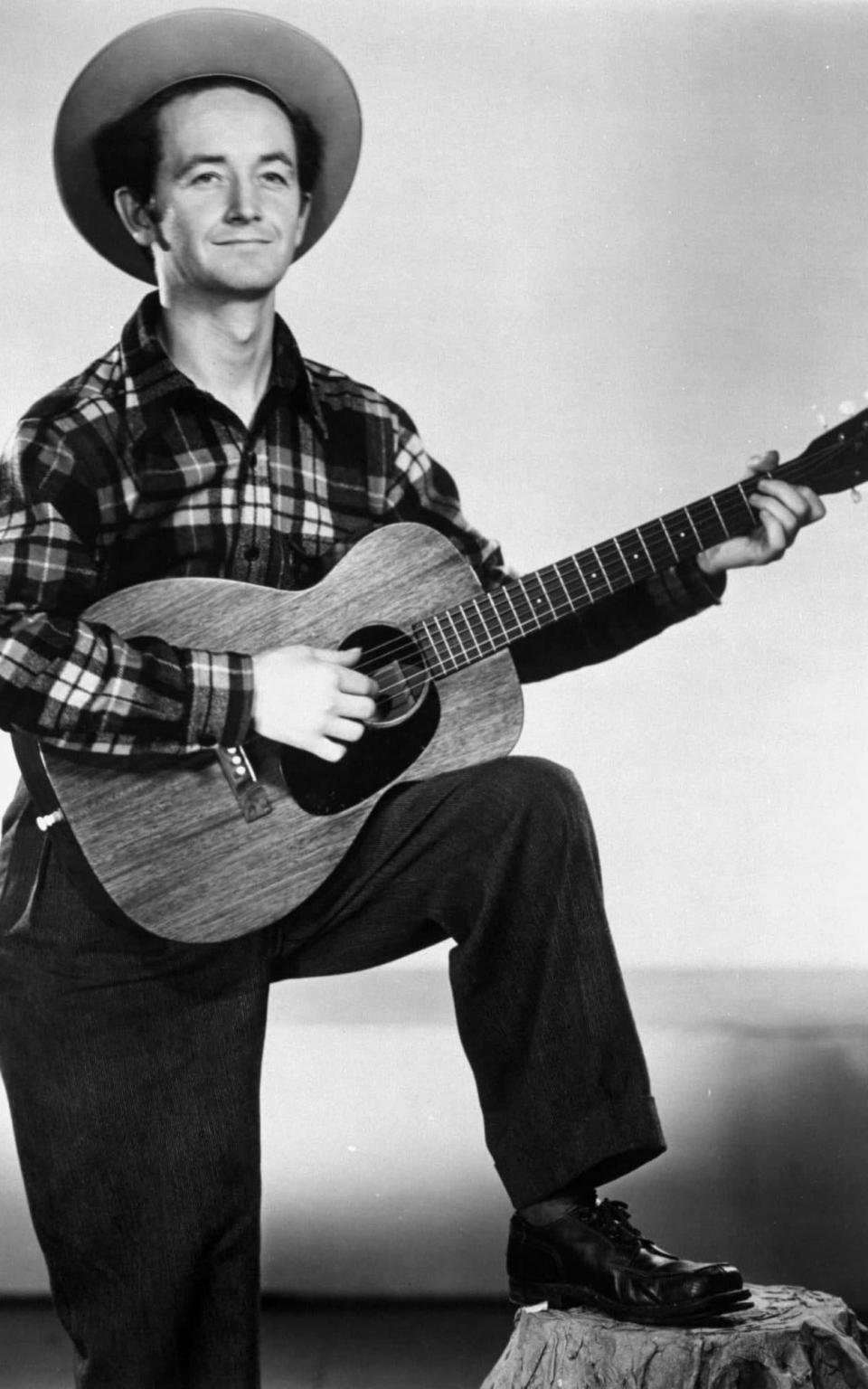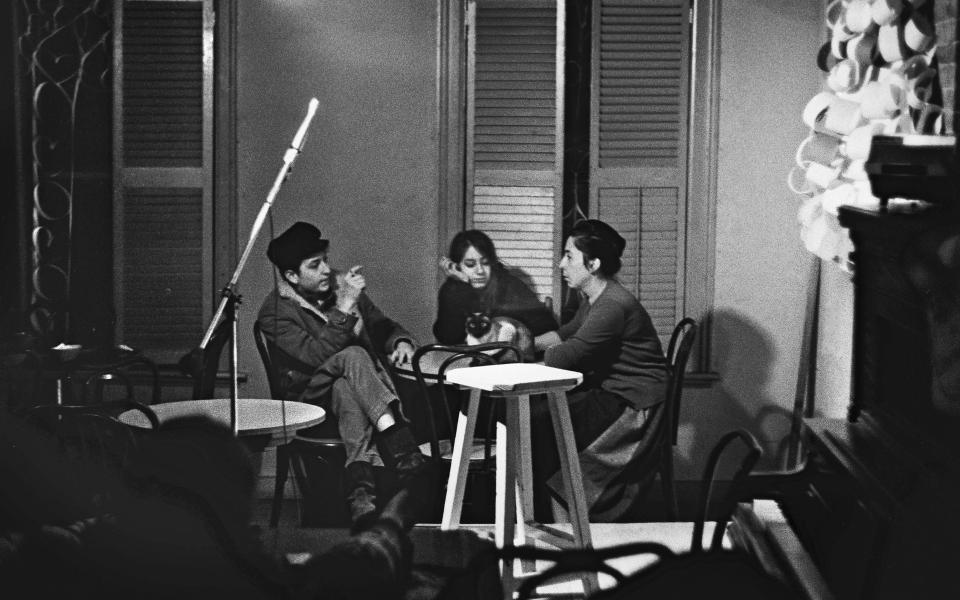This Land Is Our Land: how Lady Gaga sang an anti-Trump protest song at the Super Bowl without anybody noticing
She may have sung in a spangly suit and leapt off the top of a football stadium, but for some viewers Lady Gaga lacked a certain something during her Super Bowl halftime show on Sunday: politics.
The reviews that tumbled in on Monday morning largely praised Gaga’s performance, but noted that the avowed Trump critic spared her audience any controversy. “Most of the show was simply about full-tilt pop fun”, new New York Times surmised. Gaga “played it safe”, the Guardian wrote.
Inclusivity, love and kindness has always been the backbone of Gaga’s music and image, and this was the case on stage at the NRG Stadium in Houston: Gaga sang her LGBT anthem Born This Way and was backed by a crew of dancers of colour. But her proclamations were family-friendly: “We’re here to make you feel good”, she declared at her piano. Viewers tweeting along praised the pop star for “not getting political”.
Certainly, after Beyoncé rankled some viewers with a Blank Panthers-inspired performance during 2016’s Super Bowl, Gaga’s halftime may have seemed less heavy-hitting – politically speaking, at least.
But perhaps Gaga’s message was hiding in plain sight: she opened with a medley of God Bless America by Irving Berlin and Woody Guthrie’s protest song This Land is Our Land, an anthem that has not only been adopted by protesters at anti-Donald Trump marches, but was written while Guthrie was paying rent to Trump’s father – the creator of the real estate empire that helped to land the controversial president in the White House.
‘All you can write is what you see’
The lyrics of Guthrie's song were no fantasy: the 27-year-old musician wrote it while hitchhiking across America from California to New York, where he would try to make it as a singer and be welcomed into the city's left-leaning folk music circles. It was 1939, and America was still wracked by the Great Depression – Guthrie had been travelling around as an itinerant worker for most of the decade, and sending money back to his wife and three children.
Irving Berlin, the Jewish-American lyricist and composer, had written God Bless America in 1918 while serving in the army. Twenty years later the rise of Hitler encouraged him to revive it. It was sung on Armistice Day 1938 by singer Kate Smith on her radio show, and had become a sensation across the country.
"With his thumb stuck out in the February wind [Guthrie] was going across Pennsylvania," recalled Pete Seeger in a 2010 interview with Radiolab. Seeger was seven years Guthrie's junior and one of his first friends in New York. "He stopped for a cup of coffee and he heard Kate Smith singing God Bless America come on the jukebox. It was a hit song. [Guthrie] made up some verses: 'As I was walking that ribbon of highway, I saw above me that endless skyway / I saw below me that golden valley / God blessed America for me'."
Guthrie didn't like God Bless America. He found it schmaltzy and unrealistic, and he changed his original adaptation of the lyric – God blessed America for me – to the title refrain of "This land was made for you and me". But This Land is Your Land was more than a mere parody, Guthrie's daughter Nora told Radiolab, it was also a document of his journey as a poor man in search of a better life.
"At first he wrote it almost as a parody of the Berlin song, that was country humour at the time," his daughter said. "A tongue-in-cheek 'God Blessed America for me, ha ha'. Then he later said it was more serious than that. It’s interesting to pause and say, this isn’t poetry, it’s journalism."
It wasn't until 1997 that the world would learn of how political Guthrie's lyrics really were. Only three of the original six verses were published and those concerned themselves with America's sparkling sands and waving wheat fields. But the others tell a darker side of Guthrie's experience – of hunger, poverty and land ownership:
Was a high wall there that tried to stop me
A sign was painted said: Private Property,
But on the back side it didn't say nothingGod blessed America for me.
[This land was made for you and me.]
When the sun come shining, then I was strolling
In wheat fields waving and dust clouds rolling;
The voice was chanting as the fog was lifting:God blessed America for me.
[This land was made for you and me.]One bright sunny morning in the shadow of the steeple
By the Relief Office I saw my people
As they stood hungry, I stood there wondering ifGod blessed America for me.
[This land was made for you and me.]
At the bottom of the first draft for This Land is Your Land is an asterisk, written next to it a command that Nora has since called Guthrie's mission statement: "all you can write is what you see".
This Land is Trump’s Land
New York had a housing crisis after the war. Hundreds of thousands of servicemen returned to the city and needed somewhere to live. While state and city authorities usually stepped in to fund low-cost housing projects, the demand caused the Federal Housing Authority to issue loans and subsidies to build apartment blocks in urban areas. One of the developers who took advantage of the schemes was Fred Trump. He built public housing projects, collected rent on them, and, in 1954, was investigated by a Senate committee for profiteering off public contracts. His son, Donald, was eight years old at the time.
In 1950, Guthrie moved into one of Trump's most contentious properties, Beach Haven in Brooklyn. He signed a lease and lived there for two years – long enough for the singer to clock that Trump was, in the words of his biographer Gwenda Blair, enthusiastically abiding by the Authority's "restrictive covenants" that would stop his properties from being sold to non-white people.
Guthrie voiced his anger at living in "Bitch Havens" in lyrics and poetry in unpublished notebooks that can be found in his archives:
Beach Haven ain’t my home!
I just cain’t pay this rent!
My money’s down the drain!
And my soul is badly bent!
Beach Haven looks like heaven
Where no black ones come to roam!
No, no, no! Old Man Trump!
Old Beach Haven ain’t my home!
Between 1973 and 1978, the Civil Rights Division of the US Justice Department brought a case against Trump accusing him of "racially discriminatory conduct by Trump agents". Employees had provided evidence of doormen discouraging black people who came to view apartments, or claiming there were no vacancies. There were records that Trump had wanted to "decrease the number of black tenants" in his development.
Guthrie would never live to see justice done to his landlord. He died 12 years before the Village Voice published an expose about Trump's practices in 1979.
‘I said to myself I was going to be Guthrie's greatest disciple’
Guthrie tucked the song away and forgot about it, he would later claim, for five years. This Land is Your Land wouldn't be recorded until 1944, and it would take another seven years for it to be released, in 1951. By this point, McCarthyism had taken hold and with many in Guthrie's circle being blacklisted, his work became less desirable to the music industry.
However, publisher Howie Richmond not only took on Guthrie's work, he took it to the masses in 1951. "[Richmond] was the one who took on Woody's work when others wouldn't," Nora recalled. Richmond really liked This Land is Your Land – not for its overt political content, but because of its catchy, pleasing tune. He cut down the verses from an unwieldy six to a child-friendly three and published it in a music teachers' songbook. The result was that children across the nation were taught to sing This Land is Your Land throughout the country.
"It was done innocently," Guthrie's daughter said, "the song would never have been sung by kids if it had all six verses. Who sings six verses of anything anywhere, in any school?"
The song was also reaching daycare centres and church halls thanks to Seeger, who was playing any venue that would have him after being blacklisted in 1955. He would always include a couple of Guthrie's songs on his set list, and frequently This Land is Your Land was among them.
But it was Dylan who would bring Guthrie fame as the song's writer. Like Guthrie before him, the young troubadour had journeyed to New York to become a musician – but visiting the older singer-songwriter was a considerable lure. Dylan later admitted, "I said to myself I was going to be Guthrie's greatest disciple".
"He came round the house, spent time at the hospital with my dad", Nora recalls (Guthrie died of Huntingdon's Disease in 1967, after a suffering from the illness for 15 years). "Dylan was the one who made him famous."
In 1962, Dylan was still only emerging as the voice of a generation, but he was influential enough to direct people's attention to Guthrie with one of his first songs, Song To Woody. Suddenly, an entire generation of people who had sung This Land is My Land in school had a lightbulb moment: "They knew the song, but they didn't know anything about the writer of the song until Dylan sang his," says Nora.
‘I believe in the spirit of equality, and the spirit of this country as one of love and compassion and kindness’
Before the Super Bowl, Gaga said that she would be sticking by the philosophy that had guided her whole career:
The only statements that I’ll be making during the halftime show are the ones that I’ve been consistently making throughout my career. I believe in a passion for inclusion. I believe in the spirit of equality, and the spirit of this country as one of love and compassion and kindness. So my performance will have both those philosophies.
We'll never know if Gaga knew that Guthrie hated the policies of the man who created the President. Nobody can say if she was nodding to musical history by seguing between Berlin's hit and the song written out of spite of it. But by bringing both to a global audience of 100 million people, she has shone a new light on Guthrie and his song of equality for all Americans – no matter what change they have in their pockets.

 Yahoo News
Yahoo News 




